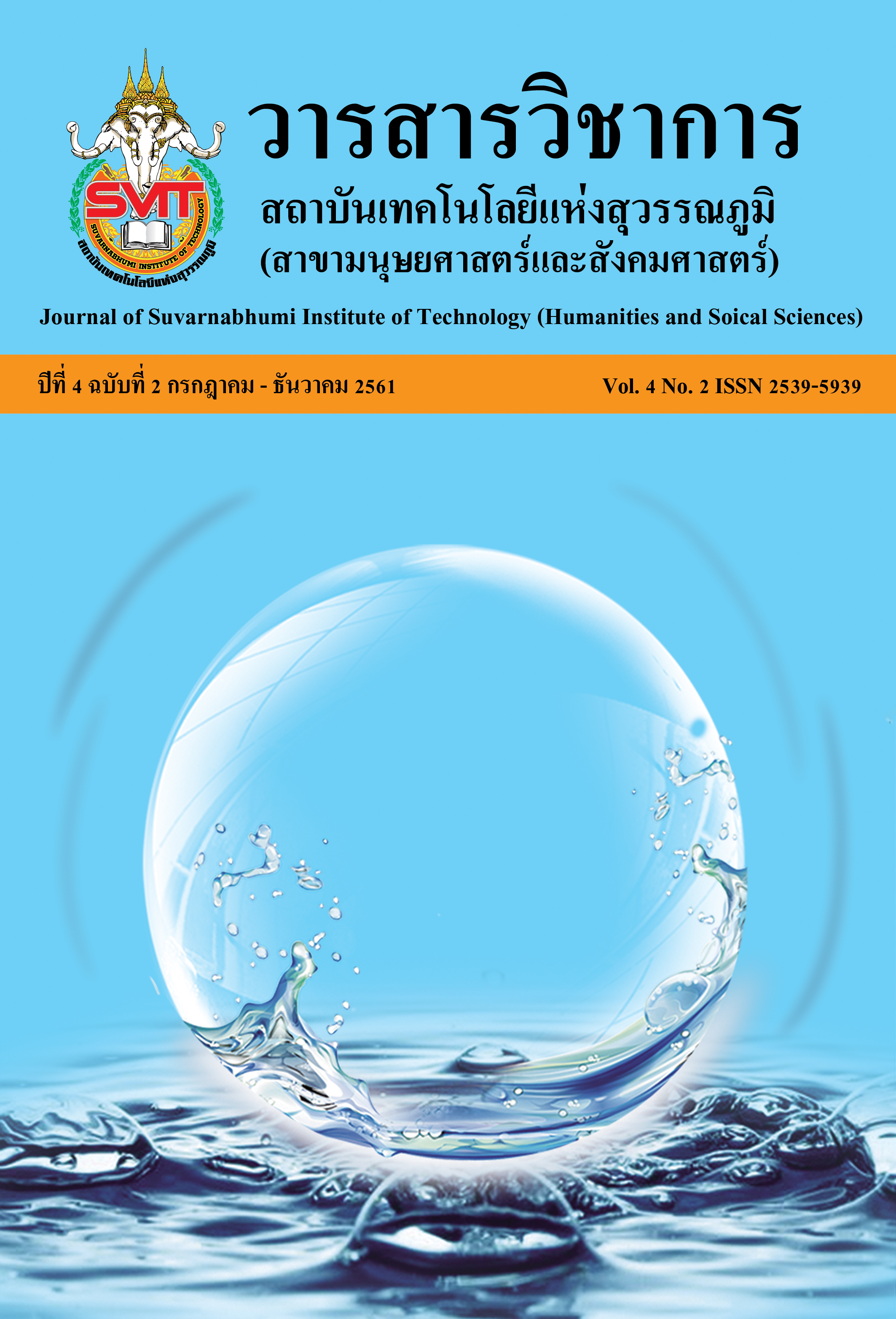INNOVATIVE LEADERSHIP AMONG THAILAND’S HIGHER EDUCATION ADMINISTRATORS IN THAILAND 4.0 ERA
Keywords:
Administrator of higher education institution, Innovative leadership, and Thailand 4.0Abstract
This research aims 1) to study the innovative leadership among Thailand’s Higher Education administrators 2) to study the innovative leadership of administrators that affect the achievement among Thailand’s Higher Education in Thailand 4.0 Era. The research is Mixed Methods Research, which consists of the qualitative method through in-depth interview with 5 groups of experts are 1) The Federation of Thai Industries 2) The Thai Chamber of Commerce 3) The Ministry of Education 4) The Working Group of Deputy Ministers of Education and 5) The Stakeholders. In addition, the other qualitative method used is Focus Group with 8 experts or educational administrators in Thailand’s Higher Education. The statistics used in the research were frequency, percentage, mean, standard deviation, exploratory factor analysis and multiple regression analysis. The questionnaire was used to collect data from the sample with the simple random sampling method. The sample consisted of 471 education administrators in the Thailand’s Higher Education Institutions, namely the president, vice president and dean. The results found that the innovative leadership among Thailand’s higher education administrators can be classified into four categories which include: 1) GEM Innovative Leader 2) Work – Life Blend Innovative Leader 3) Globalization Innovative Leader and 4) Open – Up Innovative Leader. The analysis of the innovative leadership administrators that affect the achievement among Thailand’s Higher Education in Thailand 4.0 Era can be classified into 11 results, consisting of 1) budget and resource 2) student 3) educational administration 4) learning and growth 5) stakeholders 6) teaching 7) research 8) academic engagement with the society 9) art and cultural conservation 10) competitiveness and 11) attitude of the employers to the graduates. Suggestions for the use of the research are as follows: 1) it can be used as a framework for defining criteria or qualification in recruiting and selecting candidates for administrator positions. 2) can be used as a framework for administrator training course development. (Sig = .05)
References
เคโร อันซีนดอดคอม. (2556). คุณภาพการศึกษาไทย รั้งอันดับ 8 ใน อาเซียน. เข้าถึงได้จากhttp://www.uasean.com/kerobow01/650
จิรวัฒน์ พีระสันต์ และวิรุณ ตั้งเจริญ. (2542). การพัฒนารูปแบบภารกิจของมหาวิทยาลัยใน การพัฒนาศิลปกรรมท้องถิ่น: กรณีศึกษามหาวิทยาลัยนเรศวร. วารสารมหาวิทยาลัยนเรศวร, 12 (1), 25-36.
พสุ เดชะรินทร์. (2546). Balanced Scorecard รู้ลึกในการปฏิบัติ. กรุงเทพฯ: โรงพิมพ์แห่ง จุฬาลงกรณ์มหาวิทยาลัย.
พัชรีพร วรจักร. (2559). รูปแบบการทำนุบำรุงศิลปวัฒนธรรมของสถาบันอุดมศึกษาในภาคตะวันออกเฉียงเหนือ. (ดุษฎีนิพนธ์การบริหารการศึกษา. สาขาวิชาการบริหารการศึกษา, คณะศึกษาศาสตร์, มหาวิทยาลัยบูรพา).
มานิต บุญประเสริฐ และคณะ. (2549). การพัฒนาภาวะผู้นำในระดับอุดมศึกษา. กรุงเทพฯ: สำนักงานเลขาธิการสภาการศึกษา.
ลัดดา ปินตา และ สุรชัย อุตมอ่าง. (2558). การรับรู้คุณภาพของบัณฑิต ทัศนคติของผู้ประกอบการที่มีต่อคุณสมบัติและสมรรถนะที่มีความจำเป็นของบัณฑิตหลักสูตรกลุ่มวิชาการจัดการสำหรับมหาวิทยาลัยที่มุ่งเน้นให้เป็นบัณฑิตนักปฏิบัติ. วารสารวิชาการคณะมนุษยศาสตร์และสังคมศาสตร์ คณะมนุษยศาสตร์และสังคมศาสตร์ มหาวิทยาลัยสงขลานครินทร์ วิทยาเขตปัตตานี, 11(2), 145-170.
สถาบันส่งเสริมการจัดการความรู้เพื่อสังคม. กองบริหารงานวิจัยและประกันคุณภาพการศึกษา. (2559). พิมพ์เขียว Thailand 4.0 โมเดลขับเคลื่อนประเทศไทยสู่ความมั่งคั่ง มั่นคง และยั่งยืน. เข้าถึงได้จาก https://waa.inter.nstda.or.th/stks/pub/2017/20171114-draeqa-blueprint.pdf
สำนักงานคณะกรรมการการอุดมศึกษา. (2551). กรอบแผนอุดมศึกษาระยะยาว 15 ปี ฉบับที่ 2 (2551-2565). เข้าถึงได้จาก http://www.rpu.ac.th/Library_web/doc/e- book_ T/HEPlan_book.pdf สำนักนายกรัฐมนตรี. (2559). ร่างยุทธศาสตร์ชาติ ระยะ 20 ปี (พ.ศ. 2560-2579). เข้าถึงได้จาก http://www.nesdb.go.th/download/document/%E0%B8%A3%E0%B9%88%E0%B8%B2%E0%B8%87%E0%B8%A2%E0%B8%B8%E0%B8%97%E0%B8%98%E0%B8%A8%E0%B8%B2%E0%B8%AA%E0%B8%95%E0%B8%A3%E0%B9%8C%E0%B8%8A%E0%B8%B2%E0%B8%95%E0%B8%B4%20%E0%B8%A3%E0%B8%B0%E0%B8%A2%E0%B8%B0%2020%20%E0%B8%9B%E0%B8%B5%20(%E0%B8%9E.%E0%B8%A82560%20-%202579).pdf
สุภัทร จำปาทอง. (2560). Roles of the Office of Higher Education: Thailand 4.0. เข้าถึงได้จากhttp://www.atpac.org/wp-content/uploads/2017/07/5A1-ATPAC-2018-Eng-version-26.1.18 -use-final.pdf.
อุไรวรรณ ธนสถิต. (2541). ภารกิจของมหาวิทยาลัยเอกชนในการจัดการอุดมศึกษาของชาติ. กรุงเทพฯ: วิทยาลัยป้องกันราชอาณาจักร.
Au-Yong-Oliveira, M., Gonçalves, R., Martins, J., & Branco, F. (2018). The social impact of technology on millennials and consequences for higher education and leadership. Telematics and Informatics, 35(40), 954-963.
Baxter, W. (2017). Thailand 4.0 and the Future of Work in the Kingdom. Retrieved from http://www.ilo.org/wcmsp5/groups/public/---dgreports/--- dcomm/documents/ meetingdocument/wcms_549062.pdf
Best, John W. (1981). Research in education (4th ed.). New Jersey: Prentice-Hall of India.
Butt, B. Z., & Rehman, K. U. (2010). A study examining the students satisfaction in higher education. Procedia Social and Behavioral Sciences, 2(2), 5446–5450.
Cameron, S. K., & Quinn, E. R. (1999). Diagnosing and changing organizational culture: based on the competing value framework. New York: AddisonWesley.
Crompton, H., & Burke, D. (2018). The use of mobile learning in higher education: A systematic review. Compute and Education, 123, 53-64.
Donate, M. J., & Sánchez, . P. J. D. (2015). The role of knowledge-oriented leadership in knowledge management practices and innovation. Journal of Business Research, 68(2), 360-370.
Dubrin, A. J. (2013). Leadership research findings, Practice, and Skills (7thed.). South-Western: Cengage Learning.
Draft, R. L. (1999). Leadership: Theory and Practice. Orlando, FL: Dryden Press.
Economic needs drive change in higher education. (2018, April 16). Bangkok Post, Retrieved from https://www.bangkokpost.com/business/news/1441566/economic-needs-drive-change-in-higher-education.
Hannah, S. T., Balthazard, P. A., Waldman, D. A., Jennings, P. L., & Thatcher, R. W. (2013). The psychological and neurological bases of leader self-complexity and effects on adaptive decision-making. Journal of Applied Psychology, 98(3), 393-411.
Kaplan, R. S., & Harvard Business School. (2010). Conceptual foundations of the balanced scorecard. Boston: Harvard Business School.
Mahdi, O. R., Nassar, I. A., & Almsafir, M. K. (in press). Knowledge management processes and sustainable competitive advantage: An empirical examination in private universities. Journal of Business Research. Retrieved from https://www.sciencedirect.com/science/article/abs/pii/S0148296318300882
Maric, I. (2013). Stakeholder analysis of higher education institutions. Interdisciplinary Description of Complex Systems, 11(2), 217-226.
Reyes, A. (in press). Connecting higher education and innovation to local development. Futures. Retrieved from https://www.sciencedirect.com /science/ article/pii/ S0016328717303440
Schneiderman, A. M. (1999). Why balanced scorecard fail. Journal of Strategic Performance Measurement, Special edition (January), 6-11.
Snyder, C. R., Lopez, S. J., & Pedrotti, J. T. (2011). Positive psychology: The scientific and practical explorations of human strengths. (2nded.). Thousand Oaks: Sage.
Yeravdekar, V. R., & Tiwari, G. (2014). Internationalization of higher education and its impact on enhancing corporate competitiveness and comparative skill formation. Procedia - Social and Behavioral Sciences, 157, 203-209.
Yu, V. (2009). Principal leadership for private schools improvement: The Singapore perspective. The Journal of International Social Research, 2(6), 714-749.
Yukl, G. A. (2013). Leadership in Organizations (8thed.). Boston: Pearson.
Downloads
Published
Issue
Section
License
บทความที่ได้รับการตีพิมพ์เป็นลิขสิทธิ์ของวารสาร Sarasas Journal of Humanities and Social Science ข้อความที่ปรากฏในบทความแต่ละเรื่องในวารสารวิชาการเล่มนี้เป็นความคิดเห็นส่วนตัวของผู้เขียนแต่ละท่านไม่เกี่ยวข้องกับสถาบันสารสาสน์เทคโนโลยีแห่งสุวรรณภูมิแต่อย่างใด ความรับผิดชอบองค์ประกอบทั้งหมดของบทความแต่ละเรื่องเป็นของผู้เขียนแต่ละท่าน หากมีความผิดพลาดใดๆ ผู้เขียนแต่ละท่านจะรับผิดชอบบทความของตนเองแต่ผู้เดียว



